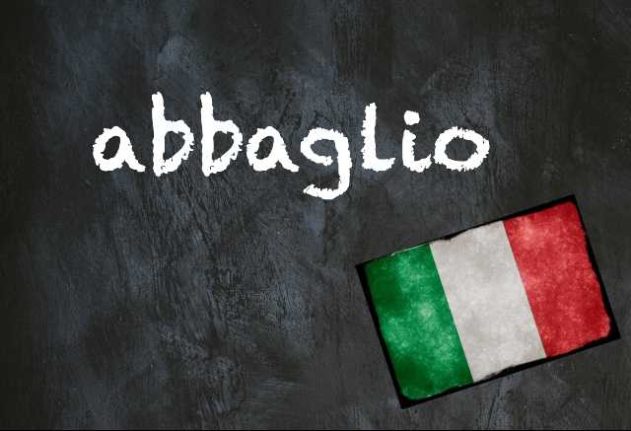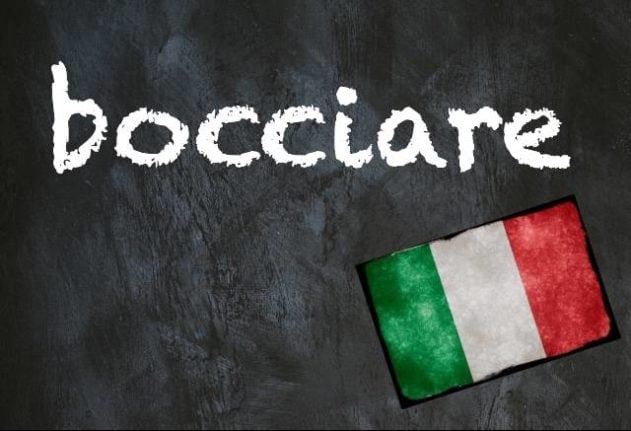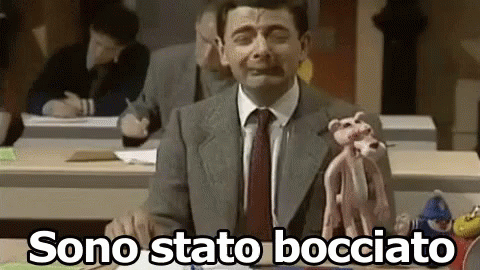It comes for us all sooner or later, no matter how hard you try: at some point you’re going to make a mistake, a humiliating blunder – in Italian, an abbaglio.
Si tratta di un clamoroso abbaglio.
It’s a major blunder.
Stiamo provando di spacciarlo per un abbaglio loro, prima che incolpino noi.
We’re trying to pass it off as their mistake before they blame us.
(Hear abbaglio pronounced here.)
Abbagliare as a verb means to dazzle with a bright light, and an abbaglio can also (rarely) mean a glare or a blinding light.

A metaphorical abbaglio occurs, then, when you’re dazzled into wrongness.
And in fact abbagliarsi – literally, to be blinded – can also mean to fall for something, to allow yourself to be deceived.
Ti sei lasciata abbagliare dalle sue false promesse.
You let yourself be tricked by her false promises.
I suoi discorsi appassionati ed eloquenti hanno abbagliato il popolo.
His impassioned and eloquent speeches blinded the public.
The noun abbaglio is often paired with the verb prendere to form prendere un abbaglio: to misunderstand, get the wrong idea, or get the wrong end of the stick.
Si vede che ha preso un abbaglio.
You can see he got the wrong end of the stick.
Prima che tu prenda un abbaglio, ti devo dire che non è interessata.
Before you go barking up the wrong tree, I have to tell you she’s not interested.
Hopefully, now you at least won’t get the wrong end of the stick when it comes to abbaglio.
Do you have a favourite Italian word or phrase you’d like us to feature? If so, please email us with your suggestion.
Make sure you don’t miss any of our Italian words and expressions of the day: download our new app (available on Apple and Android) and then select the Italian Word of the Day in your Notification options via the User button.

 Nicolas Raymond" srcset="https://apiwp.thelocal.com/wp-content/uploads/2021/09/abbaglio-1-631x431.jpg 631w, https://apiwp.thelocal.com/wp-content/uploads/2021/09/abbaglio-1-300x205.jpg 300w, https://apiwp.thelocal.com/wp-content/uploads/2021/09/abbaglio-1-80x55.jpg 80w, https://apiwp.thelocal.com/wp-content/uploads/2021/09/abbaglio-1-108x74.jpg 108w, https://apiwp.thelocal.com/wp-content/uploads/2021/09/abbaglio-1.jpg 640w" sizes="(max-width: 631px) 100vw, 631px"/>
Nicolas Raymond" srcset="https://apiwp.thelocal.com/wp-content/uploads/2021/09/abbaglio-1-631x431.jpg 631w, https://apiwp.thelocal.com/wp-content/uploads/2021/09/abbaglio-1-300x205.jpg 300w, https://apiwp.thelocal.com/wp-content/uploads/2021/09/abbaglio-1-80x55.jpg 80w, https://apiwp.thelocal.com/wp-content/uploads/2021/09/abbaglio-1-108x74.jpg 108w, https://apiwp.thelocal.com/wp-content/uploads/2021/09/abbaglio-1.jpg 640w" sizes="(max-width: 631px) 100vw, 631px"/>


 Please whitelist us to continue reading.
Please whitelist us to continue reading.
Member comments